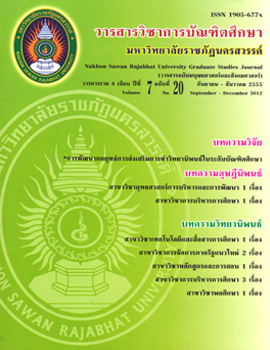การพัฒนารูปแบบความร่วมมือในการบริหารงานวิชาการของโรงเรียนขยายโอกาสทางการศึกษา สังกัดสำนักงานคณะกรรมการการศึกษาขั้นพื้นฐาน
Main Article Content
Abstract
บทคัดย่อ
การวิจัยครั้งนี้ มีวัตถุประสงค์เพื่อพัฒนารูปแบบความร่วมมือในการบริหารงานวิชาการของโรงเรียนขยายโอกาสทางการศึกษา สังกัดสำนักงานคณะกรรมการการศึกษาขั้นพื้นฐาน กลุ่มตัวอย่าง ได้แก่ ผู้บริหารสถานศึกษา 345 คน ครูวิชาการ 349 คน นักการศึกษา 14 คน ผู้ทรงคุณวุฒิ 7 คน เครื่องมือที่ใช้ในการวิจัยประกอบด้วย 1) แบบวิเคราะห์เนื้อหา 2) แบบสอบถาม 3) แบบสัมภาษณ์ 4) คู่มือที่ใช้ในการทดลอง 5) แบบประเมินความสอดคล้อง 6) แบบตรวจสอบรายการ และ7) แบบประเมินผล วิเคราะห์ข้อมูลโดยการวิเคราะห์เนื้อหา การวิเคราะห์ข้อสรุปอุปนัย สถิติที่ใช้ในการวิจัย ได้แก่ ร้อยละ ค่าเฉลี่ย และส่วนเบี่ยงเบนมาตรฐาน
ผลการวิจัยพบว่า
1. ข้อมูลพื้นฐานที่ใช้ในการกำหนดองค์ประกอบของรูปแบบความร่วมมือ ได้แก่ปัญหาการบริหารงานวิชาการและความต้องการร่วมมือในการบริหารงานวิชาการ ด้านการวิจัยเพื่อพัฒนาคุณภาพการศึกษา รองลงมาคือ การพัฒนาสื่อ นวัตกรรม และเทคโนโลยีเพื่อการศึกษา การประสานความร่วมมือในการพัฒนาวิชาการกับสถานศึกษาอื่น การส่งเสริมความรู้ด้านวิชาการแก่ชุมชน และการพัฒนาแหล่งเรียนรู้โดยโรงเรียนและ สถาบันการศึกษามีความพร้อมที่จะให้การช่วยเหลือโรงเรียนขยายโอกาสทางการศึกษา
2. รูปแบบความร่วมมือในการบริหารงานวิชาการ ซึ่งประกอบด้วย 1) หลักการความร่วมมือ 8 ข้อ
2)วัตถุประสงค์ 5 ข้อ 3)โครงสร้างความร่วมมือ 6 ข้อ 4) กิจกรรมความร่วมมือ 5 ข้อ 5) การติดตามผลความร่วมมือ 5 ข้อ 6) การประเมินผลความร่วมมือ 5 ข้อ และ 7) ตัวชี้วัดความสำเร็จ 6 ข้อ
3. การทดลองใช้รูปแบบความร่วมมือในการบริหารงานวิชาการ พบว่า ผลความสำเร็จในการดำเนินการความร่วมมือ มีค่าเฉลี่ยระดับของความสำเร็จในการดำเนินการโดยภาพรวม อยู่ในระดับมาก
4. รูปแบบความร่วมมือในการบริหารงานวิชาการของโรงเรียนขยายโอกาสทางการศึกษาที่พัฒนาขึ้น มีความเหมาะสมอยู่ในระดับมาก และมีประโยชน์อยู่ในระดับมาก
Abstract
The purpose of this study was to develop the Cooperation Model for academic administration of the educational opportunity expansion schools under the Office of Basic Education Commission. The sample consisted of 345 school principals, 349 teachers,14 educators and 7 experts. The research instruments were 1) a content analysis form, 2) a questionnaire, 3) a Semi-structure interview form, 4) a manual used in experiment, 5) an IOC assessment form, 6) a checklist form, and 7) an achievement assessment form. The data analysis consisted of content analysis, and inductive analytic and assessment of IOC. The research statistics were percentage, mean, and standard deviation.
The research findings are as follows:
1. The academic administration problem issue and the requirement of cooperation in academic administration is the research to develop quality of education. followed by, the development of innovative media and technology in education, collaboration in the academic development with other educational institutions, the promotion of academic knowledge in community and learning resources development. The capacity of schools and educational institutes are ready to help expand educational opportunities schools.
2. The cooperation model for academic administration of the educational opportunity expansion schools consisted of 7 components which were 1) 8 items of principles of the cooperation, 2) 5 items of objectives of the cooperation, 3) 6 items of structures of the cooperation, 4) 5 items of activities of the cooperation, 5) 5 items of follow-up of the cooperation, 6) 5 items of evaluation of the cooperation and 7) 6 items of successes indicators of the cooperation in academic administration.
3. The experiment and evaluation of the cooperation model for academic administration of the educational opportunity expansion schools were that the successes of the cooperation has a high level of the average as a whole.
4. The evaluation of the cooperation model for academic administration of the educational opportunity expansion schools found that is appropriateness and usefulness was at a high level.


